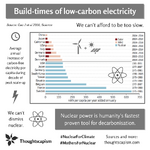Nobody has “proven the impossibility” of a sudden, radical, transformative advance in technology. Some such things have happened in the past.
Sure. But batteries work by manipulating electrons. There's a hard physical limit to their capacity per kg, set by the ratio between the amount of mass in the atoms that make them up, and the number of electrons that each atom carries.
The best ratio comes from Hydrogen, with just one nucleon per electron. But gases make poor battery materials, and hydrogen isn't solid (or even liquid) at reasonable temperatures and pressures.
The best solid (at room temperature and pressure) is Lithium, with six nucleons and three electrons - tnough only one of those electrons is easy to use.
Some simple math tells the sad story. Modern lithium batteries might improve at most tenfold (this is being very generous) due to further refinements, so lets say that we can multiply battery capacity by ten without new materials.
Then lets magically grant the ability to use all three electrons. Now we have batteries thirty times as good as today's.
Then we will magically invent a way to replace lithium with solid hydrogen, to double capacity again. We now have sixty times the energy density we have today, and because magic, let's pretend it costs exactly the same.
A sixty fold increase in storage capacity is as much as we can dare to imagine, and it's still four or five orders of magnitude too little.
Ultimately, a battery is just reversible chemistry. Burning hydrogen, or carbon, is half of the job of battery storage. Reversing that combustion is the other half. And the energy density of the process is physically limited to the binding energy of a hydrogen atom's electron to its proton. That's an absolute, hard physical limit. No amount of technological wizardry can beat it (or, due to thermodynamics, even reach it).
The only physically possible way to store more energy using matter - ie atoms - is to store it using nuclear forces, rather than just the electromagnetic one.

